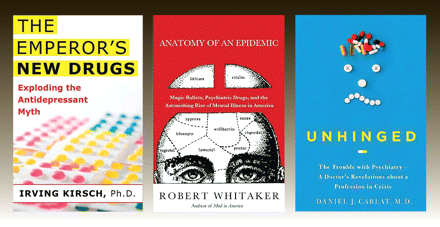Prominent M.D.'s Book Reviews Give Negative View of Psychiatry
Abstract
A two-part book review in the New York Review of Books on June 23 and July 14 by Marcia Angell, M.D., senior lecturer in social medicine at Harvard Medical School and former editor in chief of the New England Journal of Medicine, has garnered the attention—and the ire—of APA leaders and other psychiatrists.

In her review of three recent books about psychiatry, mental illness, and the rise of psychopharmacology, Angell's comments are broadly critical of the field of psychiatry, while underscoring her own vigorous criticisms of the pharmaceutical industry generally. The three books are The Emperor's New Drugs: Exploding the Antidepressant Myth, by Irving Kirsch; Anatomy of an Epidemic: Magic Bullets, Psychiatric Drugs, and the Astonishing Rise of Mental Illness in America by Robert Whitaker; and Unhinged: The Trouble With Psychiatry—A Doctor's Revelations About a Profession in Crisis, by Daniel Carlat, M.D.
"The books ... are powerful indictments of the way psychiatry is now practiced," Angell wrote. "They document the 'frenzy' of diagnosis, the overuse of drugs with sometimes devastating side effects, and widespread conflicts of interest.... If we knew that the benefits of psychoactive drugs outweighed their harms, that would be a strong argument, since there is no doubt that many people suffer grievously from mental illness. But as Kirsch, Whitaker, and Carlat argue convincingly, that expectation may be wrong."
APA leaders, in turn, find Angell's critique to be simplistic at best and deeply misinformed at worst. Much of her criticism was aimed at DSM and revisions planned for the new edition—DSM-5. APA has submitted a response to the New York Review of Books in the form of a letter by Darrel Regier, M.D., M.P.H., executive director of the American Psychiatric Institute for Research and Education and director of APA's Division of Research (see Book Review Misses Evolution of Psychiatry).
"They read not as critical reviews but, rather, as if they are news reports basically endorsing the content of the books," APA President John Oldham, M.D., said of Angell's reviews. "Her text states that 'most psychiatrists treat only with drugs,' that 'mental illness is caused primarily by chemical imbalances in the brain,' and that 'these disorders are biologically determined and not a result of environmental influences.'"
Oldham said he was puzzled by Angell's comments, "given the overwhelming evidence of the profound impact of early-life stress, trauma, or neglect and the well-recognized importance of bidirectional gene-environment interaction and the stress/vulnerability model of illness applicable across all of medicine."
At one point in one of her reviews, Angell also makes the curious statement that schizophrenia was "once mainly self-limited or episodic," to which Oldham responded, "Who were all of those patients in our state hospitals?"
He added that the tactics of industry Angell complains about apply across the rest of medicine. "There's a lot of very bad distortion in here for someone with her stature to be promoting," Oldham said.
Angell's reviews are posted at <www.nybooks.com/shared/225cc2615373ab821643c72ace3a18b7> and <www.nybooks.com/shared/227dd89163be78c35c21581f1e911822>.



